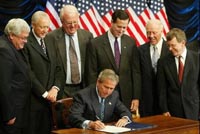Bush prepares State of the Union address for first Democratic Congress in 12 years
President George W. Bush, already facing fierce opposition to his decision to send more U.S. troops to Iraq, will confront a tough audience next Tuesday when he delivers his State of the Union address to the first Democratic Congress in 12 years.

Reducing U.S. dependence on foreign oil and supporting alternative fuels are expected to be prominent themes in his speech. Bush also will challenge Congress to fix the Social Security retirement system's long-term solvency problem, find a way to compromise on immigration, and preserve tax cuts.
Republicans see the speech as a chance for Bush to put a wide-angle lens on America's problems, taking the focus away from Iraq. Still, the war's shadow will hang over the joint session of Congress when Bush speaks.
During the nationally televised address, he will be flanked by Vice President Dick Cheney and House Speaker Nancy Pelosi, sitting like symbolic bookends of the Republican/Democrat political divide over the war and other issues.
"Probably the most interesting part of the speech is going to be the tone," said presidential speech expert Kathleen Hall Jamieson, who directs the Annenberg Public Policy Center at the University of Pennsylvania.
"Pelosi is going to be signaling the Democrats by when she applauds and when she doesn't, and Cheney is going to be signaling the Republicans," she said. "In parts where Bush seems more accommodating than Cheney might like, what are Cheney's nonverbal cues going to say to the public?"
Pelosi said Monday that Democrats will counter Bush's proposal to send more troops to Iraq with a plan changing the U.S. mission there "from combat to training, to fighting terrorism, to protecting our forces."
"We are saying to the president, 'What you are doing, first and foremost, has cost over 3,000 lives, every one of them precious to us,"' Pelosi said at a Martin Luther King Jr. Day speech in San Francisco. "The president does not have a plan. Democrats will hold him accountable."
Bush could use his speech to challenge war critics to propose a plan of their own. But he will surely leave room to cover domestic issues and other foreign policy concerns such as North Korea and Iran's nuclear programs. The costs of the war and the deficit will likely bar him from announcing expensive new initiatives.
White House officials say Bush has met with his speechwriters and given them direction, but the staff is not yet editing drafts of the address.
"President Bush will use the State of the Union to unveil a positive, comprehensive agenda that will improve the daily lives of the American people and explain how our actions in the world will make our nation safer and better," White House counselor Dan Bartlett said.
In a recent speech, Al Hubbard, chairman of the National Economic Council, predicted Bush would generate "headlines above the fold that will knock your socks off in terms of our commitment to energy independence."
The hint was that Bush, who exclaimed in his 2006 State of the Union address that America was "addicted to oil," was ready to pump more tax dollars into finding alternative sources of energy and developing domestic production of oil.
The White House has expressed interest in a recent government energy report that called for the United States to produce more biofuels made from corn, wood chips and switchgrass. The report said the U.S. goal should be to produce 13 billion gallons (49 billion liters) of biofuels by 2015 up from 1.1 billion gallons (4.16 billion liters) when Bush took office.
At this time last year, Bush was driving toward an election in which Republican control of Congress was at stake. This year, he will speak for the first time to a Congress led by the opposition party, reports AP.
Last year, he rebuked critics of his stay-the-course strategy in Iraq, where more than 2,240 American troops had been killed. This year, he will defend his new strategic plan in Iraq, where the U.S. death toll now exceeds 3,000.
Last year, Bush was a politically weakened president with a job approval rating of 40 percent. This time, he's weaker. The most recent AP-Ipsos poll shows the president's overall job approval rating at 32 percent.
Congress' approval rating is not any better, also at 32 percent.
Subscribe to Pravda.Ru Telegram channel, Facebook, RSS!





